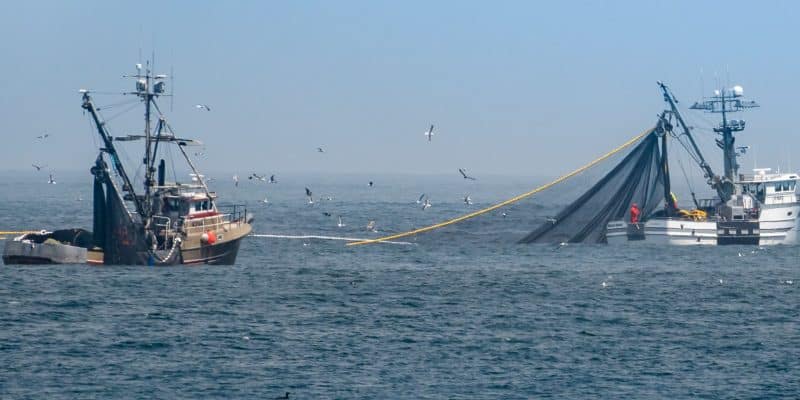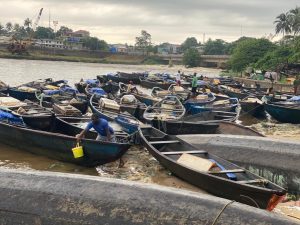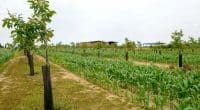Trawlers are remaining silent in the face of the ravages of illegal fishing in the Gulf of Guinea region, but not small-scale fishermen. The latter are pointing an accusing finger at industrial fishing. Trawlers are said to be primarily responsible for a phenomenon that threatens marine biodiversity and the food security of coastal communities. And yet the international community seems to have moved on to the repressive phase, with Cameroon in particular serving as an example to other countries in the region. With an annual loss of revenue of just over 33 million dollars caused by illegal fishing, the Central African country was shown the red card by the European Commission on 5 January 2023, and given the status of "non-cooperating country in the fight against illegal, unreported and unregulated fishing (IUU fishing)".
His majesty Moussenga Masono is visibly angry at the trawlers (fishing boats) that fish with impunity in the marine area reserved for small-scale fishing (from zero to 6 nautical miles, or nearly 11 kilometres from the coast). “The problem with industrial fishing is its incursion into the area reserved for small-scale fishing. These people skim our coasts, destroying and carrying away local people’s nets. As a result, catches have become rare, and the fishermen whose nets have been destroyed or swept away by the trawlers are in distress, because they no longer have enough to feed their families”, explains the traditional chief of Campo beach, one of Cameroon’s traditional fishing centres, located in the south of the country, on the border with Equatorial Guinea.
In the border town of Campo, industrial fishing is transnational in nature. “The trawlers involved in these incursions are both Cameroonian and Guinean. We sometimes even see them in Manyange na Elombo (marine protected area). And when we alert the authorities, there’s no follow-up”, laments the traditional authority who took part in the workshop to raise awareness among journalists about illegal, unreported and unregulated fishing (IUU fishing), held from 7 to 10 June 2023 in Kribi, a coastal town also located in the south of Cameroon.
Fish catches have dropped from around 100 kg to 20 kg
Small-scale fishing in Kribi is organised around the Mboa Manga landing stage. Opened in 2006, the centre handles almost 200 canoes every day. On site, we met Fabrice Junior Nguelly, who chaired the landing stage shipowners’ association for ten years. The operator paints a picture of a business that is on the wane. “Fish are disappearing from our coasts. We’ve gone from catching at least 100 kilograms every two days to just 20 kg in all the landing stages. This is due to industrial fishing, which is scouring our coasts, including fish breeding grounds”, says the artisanal fisherman, adding: “That’s why we sell a kilogram of fish for 5,000 CFA francs ($8.28). And even at that price, it’s hard to make a profit because of the taxes and other charges (registration: 52,000 CFA francs a year, fishing licence: 5,000 CFA francs a year, dock dues, fuel, i.e. a minimum of 85,000 CFA francs, or 141 dollars per fishing trip, editor’s note).
Intrusions by trawlers into the artisanal fishing zone often lead to collisions between fishing gear. Measuring around six metres long against a boat of around 28 metres, the pirogues are crushed, so much so that their occupants have sometimes lost their lives, as testimonies gathered at the Mboa Manga landing stage tell us.
Artisanal fishermen also guilty of IUU fishing
It sounds paradoxical, but it’s a reality. Artisanal fishing communities make no mention of it in their complaints, yet certain infringements of sustainable fishing are visible in their activities. At the Mboa Manga landing stage in the port city of Kribi, we found that around 60% of the pirogue fishermen were using nylon (i.e. plastic) monofilament nets. This type of net is prohibited under Cameroon’s law of 20 January 1994 governing forests, wildlife and fishing.
According to the Dutch foundation The Ocean Cleanup, more than two-thirds of large plastic waste floating at sea is made up of plastic nets, lost or abandoned by fishermen. The accumulation and gradual fragmentation of these types of fishing nets in the water has harmful consequences for marine fauna, such as the ingestion of plastic particles, which then impacts the entire food chain.
Another notable problem in the list of risks associated with these plastic nets is the generation of what is known as “ghost fishing”, by continuing to trap marine animals, particularly sea turtles.
That’s why fishermen of all kinds are advised to use cotton nets or other gear made from biodegradable materials.
The mesh size of fishing nets is another stumbling block between small-scale fishermen and the sector’s regulatory authorities. Faced with the scarcity of fish stocks, the latter are opting for small-mesh nets (with diameters of less than 50 millimetres), so as to sweep up everything on the seabed, including fry, at the risk of the survival of species and biodiversity. “We know that this is dangerous for biodiversity, and even for the availability of resources. But we prefer these mesh sizes so that we don’t come home empty-handed after spending two nights at sea”, confesses Fabrice Junior Nguelly, a fisherman in Kribi.
Lost earnings of around 33 million dollars a year
The impact of IUU fishing goes far beyond the destruction of marine biodiversity and threats to the food security of coastal communities. In economic terms, IUU fishing not only has an impact on the country’s gross domestic product (GDP) but also drastically affects the household food basket.
Read also-AFRICA: Would France like to institutionalise the plundering of the oceans?
In terms of GDP, fraudulent landings and exports of fish caught in Cameroon’s exclusive economic zone (EEZ) are forcing the country to import, which is causing an imbalance in the balance of trade, resulting in a deficit. The country imports an annual average of 300,000 tonnes of fish. In 2017, the Cameroon government estimated the total cost of illegal fishing at 33 million dollars per year. It should also be noted that illegal landings result in significant foreign exchange losses (non-payment of inspection and export taxes).
The main consequence of IUU fishing is that the price of fish products on the market has risen.
The fleet of fishing vessels falls from 80 to 37
After being shown the red card by the European Commission, Cameroon seems to have redoubled its efforts to combat IUU fishing. As a precautionary measure, in April 2023 the Prime Minister, head of the Cameroonian government, signed a decision suspending the use of the Cameroonian flag for fishing vessels until further notice.
To date, there are only 37 vessels flying the Cameroon flag, down from 80 three years ago. Curiously, none of these trawlers flying the Cameroon flag belong to nationals. “Most of them belong to Chinese operators. They use Cameroonians as cover to obtain our country’s flag. However, we don’t have the technological tools to monitor their activities outside our waters. Escaping our control, these trawlers engage in IUU fishing, and this falls on the country”, explains Guy Otete Bikimi, second national controller in the fisheries control brigade of the Cameroon Ministry of Livestock, Fisheries and Animal Industries (MINEPIA).
To improve the monitoring of fishing activities, Minepia has, among other things, experimented with a satellite tracking system for fishing vessels (VMS). It has also applied to the Cameroon Ministry of Posts and Telecommunications (Minpostel) for a maritime radio frequency.
The ten principles of transparency promoted by EJF
With IUU fishing endemic in the Gulf of Guinea, the countries of the region also face related threats, including piracy and trafficking in arms, drugs and people. In the first quarter of 2021, the Gulf of Guinea recorded 43% of all piracy incidents in the African region, according to the International Maritime Bureau. In 2020, the Gulf of Guinea recorded more than 95% of all global kidnappings at sea, according to the same source.
According to research by Maurice Beseng of the University of Sheffield (UK) into fisheries-related crime in the Gulf of Guinea region, in 2020 artisanal vessels and fishing boats were intercepted and used in Cameroon for fuel and arms smuggling and human trafficking. “The transnational nature of criminal fishing practices requires inter-agency cooperation, both within Cameroon and between the various countries. This collaboration will help concentrate resources to confront the actors and their illegal transactions”, writes Dr Beseng.
In the Central African region, civil society players such as the Environmental Justice Foundation (EJF) and the African marine mammal conservation organisation (Ammco) are working with governments to promote the principles of transparency in fishing activities. “The Cameroon government, through Minepia, is currently revising its legal framework to better combat IUU fishing. And we, as a non-governmental organisation (NGO), in partnership with Ammco, are supporting the government in this. Our support focuses specifically on the principles of transparency, such as the obligation for all shipowners to have satellite tools on board their vessels. These tools must remain switched on when they are at sea, in order to signal all their activities,” explains Younoussa Abossouka, Cameroon manager of the EJF ocean campaign.
The transparency principles promoted by EJF and its partner Ammco total ten. “Another principle is to publish the list of fishing licences granted by a country. At that point, as soon as a boat that is not on that list is at sea, we can assume that it is engaged in IUU fishing”, adds Younoussa Abossouka.
As part of this support, five workshops were held to review the legal framework, culminating in the drafting of a fisheries code. A MINEPIA file on fishing and fishing support vessels was drawn up and submitted to the Food and Agriculture Organization of the United Nations (FAO).
Boris Ngounou









You must be logged in to post a comment.